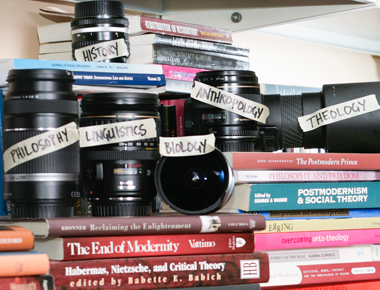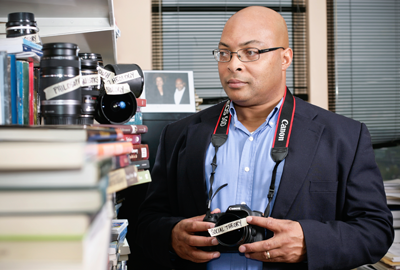By Rebekah Tilley
To fully appreciate Michelangelo’s David, one has to observe it from every vantage point. As a social theory student, Arnold Farr was similarly trained to approach academic fields of inquiry from the vantage point of several different disciplines. Now as an associate professor of philosophy, Farr has returned to the University of Kentucky and the Committee on Social Theory program that launched his own academic career.
As an undergraduate, Farr started out as a theatre major before switching to philosophy and religion. His journey to Kentucky was largely determined by how far he thought his car could take him.
“After college I had the opportunity to go to either Southern Seminary in Louisville or go to Baylor University and do philosophy in Texas,” recalled Farr. “And I chose Louisville because it was closer and my car was about to die.” After a few years in seminary, Farr made the switch to UK and philosophy.
Farr was one of the first UK students to graduate with a Certificate in Social Theory which served him well as he went on to a position at Saint Joseph’s University in Philadelphia, where he achieved tenure and his research flourished. Then last year UK offered Farr the chance to return to Lexington to take advantage of UK’s lower teaching load and research-oriented environment. This fall, Farr is teaching a cross-listed social theory and philosophy class on Western Marxism, a subject closely related to his own research projects.
In his office on the 14th floor of Patterson Office Tower, Farr’s bookshelves are double stacked. The entire Frankfurt School itself is sitting on his desk in the form of books. Much like the Frankfurt School thinkers – Marcuse, Adorno and Habermas – approached theory from a transdisciplinary perspective, so UK’s Social Theory program is set up to build bridges across the disciplines.
“You can be well trained in a particular field but otherwise be socially illiterate and not be able to have dialogue across disciplines,” said Farr, describing why this transdisciplinary approach is critical for every scholar. “Ultimately for me, what I’m trying to do as a thinker – a philosopher, a theorist or whatever – is understand the human condition. It’s impossible to have any understanding of the human condition if one is trying to acquire that understanding through the lenses of one single discipline.”
In many ways, social theory allows scholars to return to a time when academic disciplines were more fluid. Farr notes that Isaac Newton, while known primarily as a physicist, wrote more about theology than physics and had a vast understanding of the breadth as well as the depth of multiple fields of inquiry. "These guys were trying to understand the larger picture. In more recent years, we became more specialized and carved up these disciplines and made them very narrow. And I think it hasn’t been for the sake of more adequate inquiry; I think it’s been for the sake of competition. So in some ways I think the university has been determined by capitalist market forces,” said Farr.
“I think the most fruitful inquiry comes out of a team approach when you link together people from various disciplines.”
Having a working knowledge of the history of sociology, anthropology, historiography and how they are all interrelated has given Farr a much better grounding for his own work in philosophy. And as a professor teaching mixed discipline classes, being trained in social theory gives Farr the ability to connect his students’ disciplines back to what they were learning in his philosophy class.
“Unfortunately, quite often people finish their PhD and can only talk about their dissertation or their immediate research area,” said Farr. “My work in social theory allows me to speak across the disciplines in ways that a number of my peers who did not have such a program could not.”
On the cutting edge of social thought in the post-postmodern society is a new emphasis on theory and practice, something social theory is particularly well positioned impact.
“What motivates social theory is not just a desire to do theory, but the desire to bring about some kind of social change,” said Farr, describing the profoundly practically element of critical enquiry.“It’s the recognition that the democratic experiment that we’re engaged in is really an experiment that hasn’t been completed. One of the functions of theory is to understand why certain of our best ideals have not come to fruition, and how to make them come to fruition.”
What better way to do that than through social theory’s full-circle lens?
